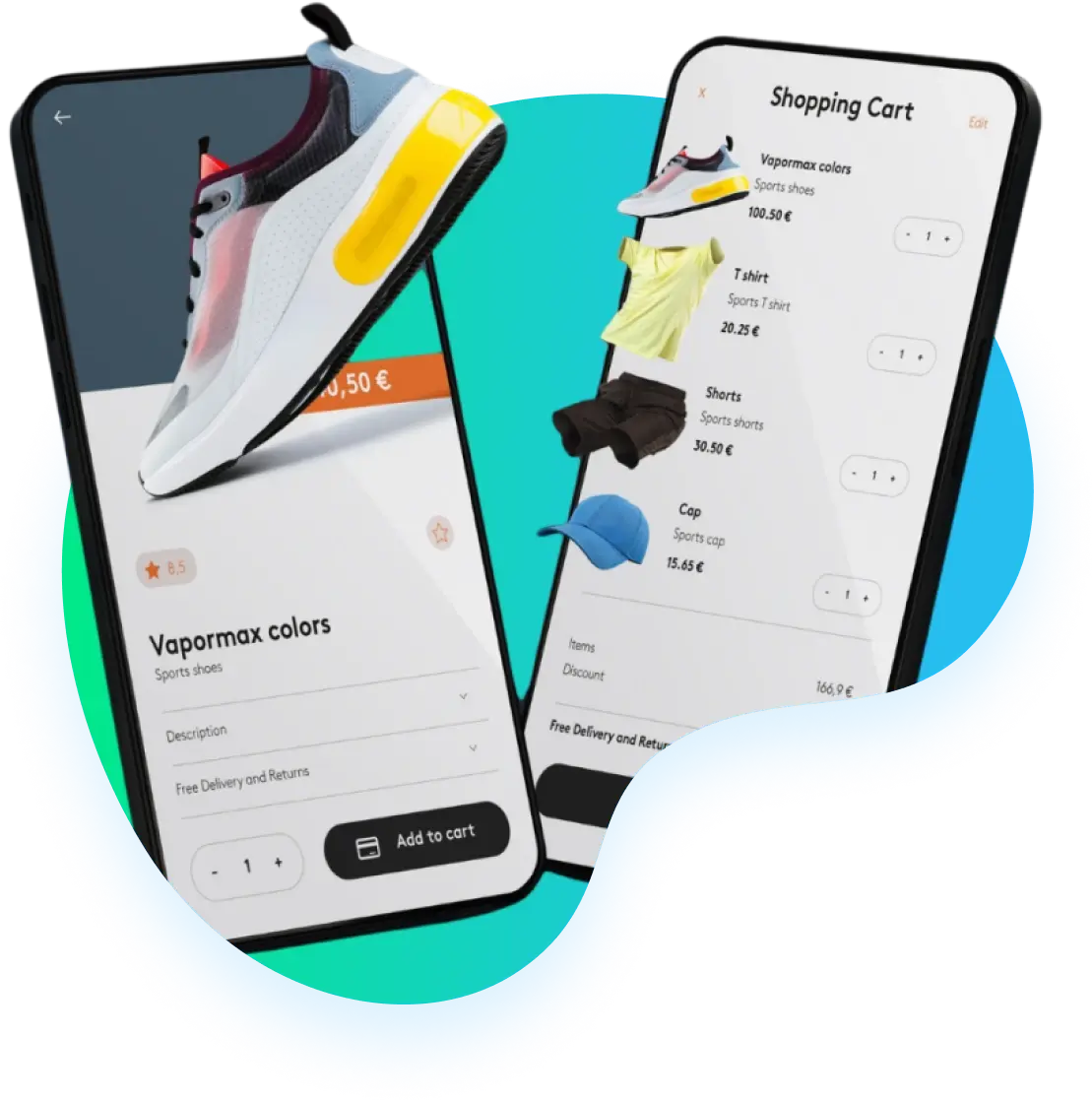We’ve all had those moments – a lightbulb flickers in our heads, and the perfect mobile app idea suddenly emerges. It could solve a unique problem, automate daily tasks, or even become the next viral hit. But the path from idea to reality often becomes a winding, confusing journey. The dream can feel just out of reach, whether it’s technical limitations, time constraints, or not knowing where to start. That’s where Above Bits, your trusted local app developers in Charlotte, steps in.
For almost two decades, we’ve been helping businesses and entrepreneurs in Charlotte and beyond bring their mobile app visions to life. With a robust team of developers specializing in iOS, Android, and cross-platform app development, we’re here to ensure that your mobile app dream doesn’t stay stuck in your head.
How We Make Complex Mobile App Dreams a Reality
You’ve probably searched for mobile app development companies near me and encountered many options. But here’s what sets us apart: we specialize in the complex. Whether you need advanced video streaming, real-time messaging, or an app that integrates artificial intelligence (AI), our team thrives on mobile app development’s challenging and technical aspects.
Let’s walk you through our process of turning your idea into a fully functional, successful mobile app. We’ll touch on the technologies we use, some global insights from major industry players, and the challenges of modern app development.
Android or iOS: Which Path to Choose?
One of the first big decisions you’ll make in your app development journey is whether to go with Android, iOS, or both. Each platform has advantages, and as your app development agency in Charlotte, we’ll help you navigate these choices.
Android App Development Charlotte
Android commands more than 70% of the market share, with its massive global user base. When you target Android users, you’re casting a wide net. But developing for Android isn’t always easy. The platform’s fragmented nature – multiple device types, operating system versions, and screen sizes – can turn the development process into a jigsaw puzzle.
Our Android developers in Charlotte, NC, are experts in navigating these hurdles. We employ advanced tools and practices to optimize your app across all devices, whether the latest Samsung Galaxy or an older Motorola phone still running Android 9. We develop using Kotlin and Java, which are native languages for Android, ensuring that your app leverages the platform’s full potential.
While Android provides a wide-reaching audience, the downside is that you may need additional resources for testing and optimization. After all, Google Play Store doesn’t have as stringent review processes as Apple’s App Store, which can lead to a higher risk of bugs and performance issues if not handled carefully.
iOS App Development
On the other hand, iOS apps may have a smaller user base, but they are generally more engaged and lucrative. With Apple’s tight control over its ecosystem, iOS development can be more straightforward. Apps designed for iPhones and iPads tend to look polished and perform seamlessly due to fewer variations in device specifications. However, iOS development can sometimes feel like walking through a minefield because of Apple’s stringent review guidelines.
At Above Bits, we know those guidelines like the back of our hand. Whether it’s designing intuitive user interfaces (UI) or optimizing performance for Apple’s latest A-series chips, we’re fully equipped to deliver iOS apps that pass Apple’s scrutiny without compromising on features.
Native or Cross-Platform Development: A Big Decision
Another critical decision is whether to build a native app or choose a cross-platform solution. As app developers in Charlotte, NC, we’re proficient in both, but the right choice depends on your app’s needs and business goals.
Native App Development
Native apps are built specifically for one platform, either Android or iOS. Android apps are coded in Java/Kotlin, while iOS apps are developed using Swift or Objective-C. The advantage of native development lies in leveraging platform-specific features such as GPS, camera functions, accelerometer, etc. Native apps also perform better, especially in speed and UI responsiveness.
However, the downsides are cost and time. Developing two separate apps for Android and iOS can be expensive and time-consuming. But if performance is your primary concern, native apps are usually the way to go.
Cross-Platform Development
Cross-platform solutions might be ideal if budget and time are significant factors. Technologies like Flutter (backed by Google) and React Native (backed by Facebook) allow developers to write code once and deploy it across Android and iOS. While cross-platform apps can’t match the performance of native apps, they’re more than sufficient for most use cases and provide a cost-effective solution for reaching a larger audience quickly.
A great example of successful cross-platform development is Alibaba, which built its app using Flutter. Uber Eats also leveraged React Native for some of its components, streamlining its development process without compromising user experience.
That said, cross-platform solutions do come with their own set of trade-offs. While they’re quicker to develop, they may face performance issues with complex features like real-time updates or high-end animations. If your app is highly interactive or requires deep integration with device-specific features, going native might still be the better option.
Tackling Complex Features: We’re Not Afraid
One of the reasons why businesses come to Above Bits is because we love solving complex problems. The more features, the better! Whether integrating machine learning algorithms, building real-time communication tools, or creating seamless video streaming experiences, our team thrives on pushing boundaries.
- Video Streaming
If you’re considering building an app like Netflix or YouTube, be prepared to deal with significant technical challenges. Video streaming apps require adaptive bitrate streaming to ensure that users on different networks and devices can have a smooth experience. We use industry-leading technologies like HLS (HTTP Live Streaming) and DASH (Dynamic Adaptive Streaming over HTTP) to make this possible.
Furthermore, hosting videos can become expensive. While AWS S3 is the go-to choice for most companies, it’s not always the most cost-effective. We’ll discuss the best cloud storage options based on your needs and scale, whether it’s Google Cloud, Microsoft Azure, or Hetzner for more affordable hosting.
- Real-Time Messaging
Real-time messaging is another complex feature we handle with ease. Whether you want to build a chat feature like WhatsApp or a collaboration tool like Slack, it requires low-latency communication and seamless integration. At Above Bits, we implement WebSockets and Firebase Cloud Messaging to ensure that users experience zero lag when communicating through your app.
- AI and Machine Learning
Artificial Intelligence is no longer just a futuristic concept. It’s here, and we’re using it to build smarter, more intuitive apps. Whether it’s integrating a chatbot or creating personalized recommendations like Spotify, we leverage tools like Google Dialogflow and Amazon Lex to bring AI-powered features into your mobile apps. And let’s not forget machine learning, which we can use to predict user behavior, improve engagement, or even automate complex tasks.
Big companies like Airbnb and Uber have embraced machine learning to provide more personalized experiences to their users. Airbnb, for instance, uses machine learning to recommend listings based on a user’s search history and preferences.
The Global Landscape: What Big Companies Are Doing Right
Large companies like Facebook, Google, and Amazon are leading the charge in mobile app development, constantly innovating and setting new standards. These tech giants offer valuable insights for smaller businesses looking to make their mark in the mobile app market. Let’s explore some lessons we can learn from these industry leaders.
Facebook and the Power of Cross-Platform Development
One of the most game-changing innovations in recent years has been Facebook’s creation of React Native, a framework that allows developers to write code once and deploy it on Android and iOS platforms. React Native has been a cornerstone for apps like Instagram and Airbnb, allowing these companies to streamline their development processes and reduce costs.
While React Native is a great tool for fast deployment and consistent updates, the framework does have some performance limitations. Complex apps that rely on intensive animations or deep integrations with hardware may experience sluggishness compared to native apps. This was evident when Facebook initially struggled with performance issues on Android, which required them to optimize their approach over time. Still, React Native remains a popular choice for many businesses seeking rapid development across multiple platforms.
Amazon’s AWS: The Backbone of Scalable Mobile Apps
Amazon Web Services (AWS) has become the go-to cloud infrastructure for many app developers, providing a highly scalable and reliable backend for applications. Some of the world’s most popular apps, such as Netflix and Twitch, rely on AWS for their cloud hosting, taking advantage of its vast array of services, including Elastic Beanstalk, EC2, and S3.
AWS offers a significant advantage: automatic scaling. AWS can scale your resources to handle increased traffic as your user base grows, ensuring your app remains responsive and functional. However, AWS also has its downsides. The steep learning curve can be daunting for businesses unfamiliar with cloud technologies, and improper setup can result in unexpectedly high bills. We at Above Bits have helped clients optimize their AWS infrastructure, saving them thousands of dollars annually by streamlining their configurations.
Google’s Flutter and the Rise of Cross-Platform Efficiency
Google has also made significant strides in mobile app development, particularly with the launch of Flutter. This cross-platform framework enables developers to build high-performance apps for both Android and iOS from a single codebase. Flutter is increasingly becoming the tool of choice for developers who want to deploy quickly without sacrificing performance.
Companies like Alibaba and BMW have embraced Flutter for their apps, capitalizing on its ability to reduce development time and costs. However, as with any technology, there are trade-offs. Flutter apps can face integration challenges with platform-specific APIs, and some developers report performance issues, particularly on older devices. Despite these minor drawbacks, Flutter continues to gain traction thanks to its flexibility and Google’s backing.
These global players show that while new technologies offer incredible benefits, they also require careful consideration of their limitations.
Downsides of Certain Technologies: Let’s Be Real
No technology is perfect. We love our tools, but they each come with quirks. Let’s talk about some of the common complaints we hear about the platforms we work with:
React Native
While React Native is fantastic for reducing development time and costs, it does have some limitations. The biggest drawback is performance. For apps that require complex animations or highly interactive features, React Native can feel sluggish compared to native apps. Furthermore, accessing certain native features of devices can require additional coding workarounds, making the development process more complicated than initially expected.
Firebase
Firebase is an excellent tool for real-time messaging and push notifications, but it can become expensive as your user base grows. Once you hit a certain threshold, scaling Firebase can be costly, particularly for smaller businesses.
Amazon Web Services (AWS)
AWS offers immense scalability and reliability but comes with a steep learning curve. Many businesses find it challenging to configure AWS services correctly, leading to unnecessarily high costs. We’ve encountered several clients paying for AWS services they didn’t need simply because the initial setup wasn’t optimized.
Flutter
Flutter has gained considerable popularity as a cross-platform development tool, but it’s not without its limitations. While it’s great for building apps quickly, Flutter apps sometimes face challenges when integrating with platform-specific APIs. The framework is also relatively new, and some developers have reported performance issues, particularly on older devices.
Why We’re the Best Mobile App Developers in Charlotte
At Above Bits, we don’t just build apps – we build partnerships. Our approach is simple: we listen, collaborate, and deliver. With nearly two decades of experience, we’ve worked with companies of all sizes, from small startups to established enterprises. We pride ourselves on being a mobile app development company in Charlotte that provides affordable, high-quality solutions.
Here’s what sets us apart:
- Transparency
We believe in clear communication and transparency from the start. There are no hidden fees or surprise charges. What you see is what you get. - Local Expertise
We understand the Charlotte business landscape and know what local businesses need to succeed. When you work with us, you’re not just getting a development team – you’re getting a partner who cares about your success as much as you do. - Post-Launch Support
The job doesn’t end when your app goes live. We offer ongoing support to ensure your app stays up-to-date with the latest technologies and remains secure.
Wrapping It Up
If your mobile app dream is stuck, we’re here to get it moving again. At Above Bits, we specialize in turning complex ideas into user-friendly, feature-rich mobile apps. Whether you’re looking to build an Android app, an iOS app, or a cross-platform solution, our team of experts is ready to take on the challenge. And with a transparent, no-nonsense approach, we ensure your app development experience is as smooth as possible.
So what are you waiting for? Contact Above Bits, the best app development company in Charlotte, and let’s start bringing your app idea to life today!








